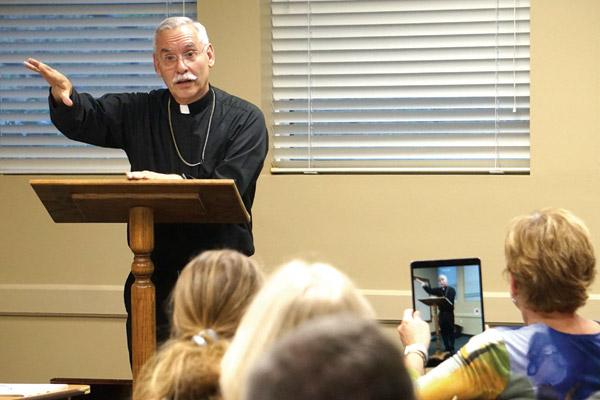
Bishop Anthony B. Taylor spoke to more than 50 people July 11 at St. John Center in Little Rock about the immigration crisis at the U.S.-Mexico border, the concept of unjust laws and what Catholics can do, as part of a speaker series of Pax Christi Little Rock, a Catholic peace and social justice organization.
“Obviously there’s a crisis at the U.S.-Mexico border,” said Pax Christi Little Rock president Sherry Simon, adding she was looking forward to his explanation on “why it’s also a right-to-life issue.”
Department of Homeland Security statistics show a 70 percent increase in migrants seeking asylum from 2017 to 2018, with escalating violence in Central America.
Bishop Taylor began his presentation by reading his letter of support to participants in the Catholic Day of Action for Immigrant Children, taking place in Washington, D.C., and around the country July 18 (see sidebar at right). Event organizers are advocating for an end to child detention.
Reports from the U.S.-Mexico border of immigrant children being separated from their parents and housed in dire conditions with no basic necessities have led many Catholic leaders to denounce the administration’s tactics.
The bishop explained meeting human rights, particularly for the poor, in terms of a family.
“We’re a human family, and so everyone should be our concern. And that our love and investment of self should expand to meet the need, rather than feeling like helping one person is a zero-sum game, helping them is going to deprive me of something,” he said.
Social worker Cecilia Chacon Trujillo, a parishioner at St. Theresa Church in Little Rock, shared some of her Deferred Action for Childhood Arrivals (DACA) recipients who, despite growing up in the U.S., have lost their status due to changes in the law and are feeling hopeless.
“I think as Catholic, Christian people, we owe it to these kids to be vocal and do something,” she told Arkansas Catholic after the presentation.
Bishop Taylor said, “What we can do is support them. And help them draw on the relationship with the Lord, to be able to overcome adversity, to deal with adversity, learn to live in a very insecure environment.”
Typically, Bishop Taylor said people will argue “the law is the law is the law” when it comes to immigrants coming into the country undocumented.
“Respect for the rule of law is, of course, important in our country. But we also have a history of unjust laws. Church teaching is that when a law is unjust, beyond a certain point, it loses its binding force,” Bishop Taylor said. “We saw that in civil rights, for instance, where we had laws that were unjust.”
The morality of immigration was addressed throughout the presentation, with Bishop Taylor pointing out that the “Bible is a story of immigration.”
“We’ve got the power to change the laws, that’s one of the blessings of this country. We have not exercised that power; we’ve failed to convince people,” he said. “We’ve been subjected to demagogues who appeal to the worst instincts in our culture ... It’s also often racist.”
Maria Maldonado, a longtime pro-life advocate in Little Rock, shared the heartbreaking story of a woman in Arkansas who came from El Salvador.
“She was raped repeatedly on the trip up here. She is pregnant; the father of their 3-year old is here … She is going to give life to this baby. She’s going to put (the baby) up for adoption,” Maldonado said.
Father Martin Siebold, pastor at St. Jude Church in Jacksonville, was moved to tears by her story.
“It’s easy to judge, but once you open the door and meet a person, you can’t be blind to that anymore,” Father Siebold said.
Please read our Comments Policy before posting.
Article comments powered by Disqus Clergy blast Texas lawsuit targeting migrant ministry
Clergy blast Texas lawsuit targeting migrant ministry
 Bishop Taylor, others urge redirecting military funds
Bishop Taylor, others urge redirecting military funds
 U.S. bishop hails government’s refugee plan for 2024
U.S. bishop hails government’s refugee plan for 2024
 Mass and holy hour mark start of Respect Life Month
Mass and holy hour mark start of Respect Life Month
 'What's going to happen?': 'Dreamers' in legal limbo
'What's going to happen?': 'Dreamers' in legal limbo
 Voluntarios de Pax Christi comprueban realidad de la frontera
Voluntarios de Pax Christi comprueban realidad de la frontera
 Winning directory photo honors Our Lady of Guadalupe
Winning directory photo honors Our Lady of Guadalupe
 St. Paul says: How does the Bible define love?
St. Paul says: How does the Bible define love?
 6 steps to getting married in Diocese of Little Rock
6 steps to getting married in Diocese of Little Rock
 Most frequently asked questions on Catholic marriage
Most frequently asked questions on Catholic marriage
 St. Joseph a model of solidarity with immigrants
St. Joseph a model of solidarity with immigrants
 Two gifts after Jesus’ death: Virgin Mary and Eucharist
Two gifts after Jesus’ death: Virgin Mary and Eucharist
 Why we have an altar, and not just a communion table
Why we have an altar, and not just a communion table
 Pope: Wars should be resolved through nonviolence
Pope: Wars should be resolved through nonviolence
 Living relationship with Jesus Christ in the Eucharist
Living relationship with Jesus Christ in the Eucharist